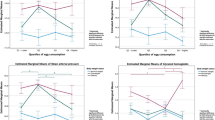Abstract
Background/Objectives:
Egg consumption has been associated with the risk of cardiovascular diseases (CVDs), but evidence is scarce and inconsistent. Our aim was to examine the association between egg consumption and incidence of CVD in a prospective dynamic Mediterranean cohort of 14 185 university graduates.
Subjects/Methods:
Egg intake was assessed using a 136-item-validated food-frequency questionnaire. Baseline consumption was categorized into no consumption or <1 egg/week, 1 egg/week, 2–4 eggs/week and >4 eggs/week. The presence of cardiovascular risk factors was assessed by questionnaire at baseline, and the incidence of CVD was assessed using biennial assessments. The median follow-up was 6.1 years. Cox regression models were fitted to estimate multivariable-adjusted hazard ratios (HRs) for CVD (myocardial infarction, revascularization procedures or stroke). Outcomes were confirmed by review of medical records.
Results:
During a median follow-up of 6.1 years, 91 new confirmed cases of CVD were observed. No association was found between egg consumption and the incidence of CVD (HR: 1.10, 95% confidence interval: 0.46–2.63) for the highest versus the lowest category of egg consumption after adjusting for age, sex, total energy intake, adherence to the Mediterranean food pattern and other cardiovascular risk factors. Results were robust to different analytical scenarios.
Conclusions:
No association between egg consumption and the incidence of CVD was found in this Mediterranean cohort.
This is a preview of subscription content, access via your institution
Access options
Subscribe to this journal
Receive 12 print issues and online access
$259.00 per year
only $21.58 per issue
Buy this article
- Purchase on Springer Link
- Instant access to full article PDF
Prices may be subject to local taxes which are calculated during checkout
Similar content being viewed by others
References
Ainsworth BE, Haskell WL, Whitt MC, Irwin ML, Swartz AM, Strath SJ et al. (2000). Compendium of physical activities: an update of activity codes and MET intensities. Med Sci Sports Exerc 32 (Suppl 9), S498–S504.
Alonso A, Beunza JJ, Delgado-Rodríguez M, Martínez-González MA (2005). Validation of self reported diagnosis of hypertension in a cohort of university graduates in Spain. BMC Public Health 5, 94.
Barraj L, Tran N, Mink P (2009). A comparison of egg consumption with other modifiable coronary heart disease lifestyle risk factors: a relative risk apportionment study. Risk Anal 29, 401–415.
Bes-Rastrollo M, Pérez JR, Sánchez-Villegas A, Alonso A, Martínez-González MA (2005). Validation of self-reported weight and body mass index in a cohort of university graduates in Spain. Rev Esp Obes 3, 352–358.
Buckland G, González CA, Agudo A, Vilardell M, Berenguer A, Amiano P et al. (2009). Adherence to the Mediterranean diet and risk of coronary heart disease in the Spanish EPIC Cohort Study. Am J Epidemiol 15, 1518–1529.
Burke V, Zhao Y, Lee AH, Hunter E, Spargo RM, Gracey M et al. (2007). Health-related behaviours as predictors of mortality and morbidity in Australian Aborigines. Prev Med 44, 135–142.
Cerdeño M (2008). Evolución de los hábitos de compra y consumo en España. 1987–2007, dos décadas del panel de consumo alimentario. Ministerio de Agricultura, Pesca y Alimentación: Madrid, p 32.
Dawber TR, Nickerson RJ, Brand FN, Pool J (1982). Eggs, serum cholesterol, and coronary heart disease. Am J Clin Nutr 36, 617–625.
De la Fuente-Arrillaga C, Vázquez Ruiz Z, Bes-Rastrollo M, Sampson L, Martinez-González MA (2010). Reproducibility of an FFQ validated in Spain. Public Health Nutr 28, 1–9.
Djousse L, Gaziano JM (2008). Egg consumption in relation to cardiovascular disease and mortality: the physicians health study. Am J Clin Nutr 87, 964–969.
Djousse L, Gaziano JM, Buring JE, Lee I. (2009). Egg consumption and risk of type 2 diabetes in men and women. Diabetes Care 32, 295–300.
Fernández-Ballart JD, Piñol JL, Zazpe I, Corella D, Carrasco P, Toledo E et al. (2010). Relative validity of a semi-quantitative food-frequency questionnaire in an elderly Mediterranean population of Spain. Br J Nutr 103, 1808–1816.
Fraser GE (1999). Associations between diet and cancer, ischemic heart disease, and all-cause mortality in non-Hispanic white California Seventh-day Adventists. Am J Clin Nutr 70, 532S–538S.
Fraser GE. (1994). Diet and coronary heart disease: beyond dietary fats and low-density-lipoprotein cholesterol. Am J Clin Nutr 59, 1117S–1123S.
Herron KL, Fernandez M. (2004). Are the current dietary guidelines regarding egg consumption appropriate? J Nutr 134, 187–190.
Houston DJ, Lee JS, Kanaya AM, Tylavsky FA, Newman AB, Visser M et al. (2010). Dietary fat and cholesterol and risk of cardiovascular disease in older adults: the Health ABC Study. Nutr Metab Cardiovasc Dis [E-pub ahead of print]. PMID: 20338738.
Hu FB, Stampfer MJ, Rimm EB, Manson JE, Ascherio A, Colditz GA et al. (1999). A prospective study of egg consumption and risk of cardiovascular disease in men and women. JAMA 281, 1387–1394.
Knekt P, Reunanen A, Järvinen R, Seppänen R, Heliövaara M, Aromaa A. (1994). Antioxidant vitamin intake and coronary mortality in a longitudinal population study. Am J Epidemiol 139, 1180–1189.
Krauss RM, Eckel RH, Howard B, Appel LJ, Daniels SR, Deckelbaum RJ et al. (2000). AHA Dietary Guidelines: revision 2000: a statement for healthcare professionals from the nutrition committee of the American Heart Association. Circulation 102, 2284–2299.
Kritchevsky SB, Kritchevsky D (2000). Egg consumption and coronary heart disease: an epidemiologic overview. J Am Coll Nutr 19, 549S–555S.
Kritchevsky SB (2004). A review of scientific research and recommendations regarding eggs. J Am Coll Nutr 23, 596S–600S.
Mann JI, Appleby PN, Key TJ, Thorogood M (1997). Dietary determinants of ischaemic heart disease in health conscious individuals. Heart 78, 450–455.
Martínez- González MA, De la Fuente C, Nuñez JM, Basterra FJ, Beunza JJ, Vazquez Z et al. (2008). Adherence to Mediterranean diet and risk of developing diabetes: prospective cohort study. BMJ 14, 1348–1351.
Martínez-González MA, García-López M, Bes-Rastrollo M, Toledo E, Martínez-Lapiscina EH, Delgado-Rodriguez M et al. (2010). Mediterranean diet and the incidence of cardiovascular disease: a Spanish cohort. Nutr Metab Cardiovasc Dis [E-pub ahead of print]. PMID:20096543.
Martínez-González MA, López-Fontana C, Varo JJ, Sánchez-Villegas A, Martínez JA (2005). Validation of the Spanish version of the physical activity questionnaire used in the nurses ‘health study and the health professionals’ follow-up study. Public Health Nutr 8, 920–927.
Martínez-González MA, Sánchez-Villegas A, De Irala J, Marti A, Martínez JA (2002). Mediterranean diet and stroke: objectives and design of the SUN project. Seguimiento Universidad de Navarra. Nutr Neurosci 5, 65–73.
Martin-Moreno JM, Boyle P, Gorgojo L, Maisonneuve P, Fernández-Rodriguez JC, Salvini S et al. (1993). Development and validation of a food frequency questionnaire in Spain. Int J Epidemiol 22, 512–519.
Mataix J. (2003). Tabla de Composición de Alimentos (food composition tables). 4th edn. Universidad de Granada: Granada.
McNamara DJ. (2000). The impact of egg limitations on coronary heart disease risk: do the numbers add up? J Am Coll Nutr 19, 540S–548S.
Moreiras O (2009). Tablas de Composición de Alimentos (Food Composition Tables). 7th edn. Ediciones Madrid Pirámide: Madrid.
Nakamura Y, Iso H, Kita Y, Ueshima H, Okada K, Konishi M et al. (2006). Egg consumption, serum total cholesterol concentrations and coronary heart disease incidence: Japan public health center-based prospective study. Br J Nutr 96, 921–928.
National Cholesterol Education Program (1994). Second report of the expert panel on detection, evaluation. Circulation 89, 1333–1445.
Nettleton JA, Steffen LM, Loehr LR, Rosamond WD (2008). Incident heart failure is associated with lower whole-grain intake and greater high-fat dairy and egg intake in the Atherosclerosis Risk in Communities (ARIC) study. J Am Diet Assoc 108, 1881–1887.
Qureshi AI, Suri FK, Ahmed S, Nasar A, Divani AA (2007). Regular egg consumption does not increase the risk of stroke and cardiovascular diseases. Med Sci Monit 13, CR1–CR8.
Seguí-Gómez M, de la Fuente C, Vázquez Z, de Irala J, Martínez-González MA (2006). Cohort profile: the ‘Seguimiento Universidad de Navarra (SUN) study’. Int J Epidemiol 35, 1417–1422.
Sofi F, Cesari F, Abbate R, Gensini GF, Casini A (2008). Adherence to Mediterranean diet and health status: meta-analysis. BMJ 11, 337–344.
Thygesen K, Alpert JS, White HD (2007). Joint ESC/ACCF/AHA/WHF task force for the redefinition of myocardial infarction. Universal definition of myocardial infarction. Eur Heart J 28, 2525–2538.
Trichopoulou A, Kouris-Blazos A, Wahlquivist M, Gnardellis D, Lagiou P, Polychronopoulos E et al. (1995). Diet and overall survival in elderly peope. BMJ 311, 1457–1460.
Willett WC (1998). Issues in Analysis and Presentation of Dietary Data. Nutritional Epidemiology. Oxford Univ Press: New York, pp321–345.
World Health Organization (2008). World Health Statistics. WHO: Ginebra.
Acknowledgements
We thank the enthusiastic collaboration and participation of the SUN cohort participants. We also thank the other members of the SUN Study Group: Alonso A, de Irala J, Delgado-Rodríguez M, Guillén-Grima F, Krafka J, Llorca J, Lopez del Burgo C, Marti A, Martínez JA, Nuñez-Córdoba JM, Pimenta A, Sánchez D, Sánchez–Villegas A, Seguí-Gómez C, Serrano-Martínez M and Toledo E. We are also grateful to the members of the Department of Nutrition of Harvard School of Public Health (A Ascherio, W Willett and FB Hu), who helped us design the SUN Study. The SUN Study has received funding from Instituto de Salud Carlos III, Oficial Agency of the Spanish Government for biomedical research (Grants PI01/0619, PI030678, PI040233, PI042241, PI050976, PI070240, PI070312, PI081943, PI080819, PI1002293, PI1002658, RD06/0045, and G03/140), the Navarra Regional Government (36/2001, 43/2002, 41/2005 and 36/2008) and the University of Navarra.
Author information
Authors and Affiliations
Consortia
Corresponding author
Ethics declarations
Competing interests
The authors declare no conflict of interest.
Rights and permissions
About this article
Cite this article
Zazpe, I., Beunza, J., Bes-Rastrollo, M. et al. Egg consumption and risk of cardiovascular disease in the SUN Project. Eur J Clin Nutr 65, 676–682 (2011). https://doi.org/10.1038/ejcn.2011.30
Received:
Revised:
Accepted:
Published:
Issue Date:
DOI: https://doi.org/10.1038/ejcn.2011.30
Keywords
This article is cited by
-
Egg consumption and cardiovascular risk: a dose–response meta-analysis of prospective cohort studies
European Journal of Nutrition (2021)
-
Egg Consumption and Risk of Cardiovascular Disease: a Critical Review
Current Emergency and Hospital Medicine Reports (2021)
-
Egg consumption and risk of all-cause and cause-specific mortality in an Italian adult population
European Journal of Nutrition (2021)
-
Moderate egg consumption and all-cause and specific-cause mortality in the Spanish European Prospective into Cancer and Nutrition (EPIC-Spain) study
European Journal of Nutrition (2019)
-
One-year daily consumption of buttermilk drink containing lutein-enriched egg-yolks does not affect endothelial function in fasting and postprandial state
Scientific Reports (2017)



